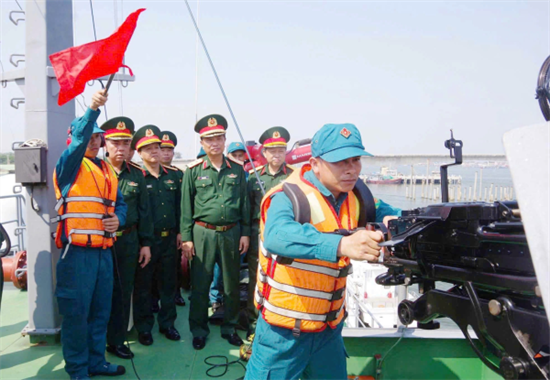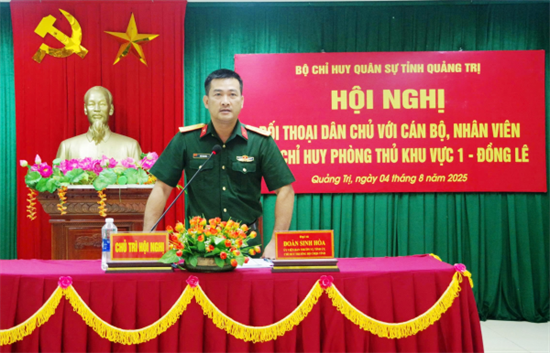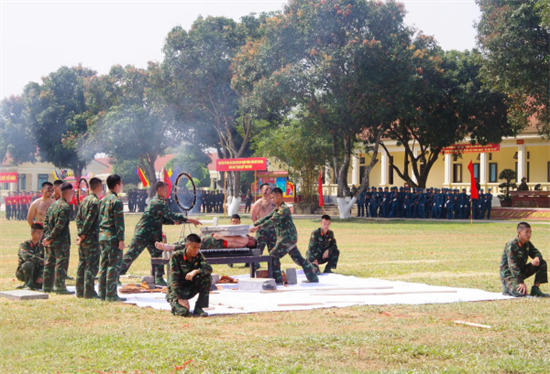The adoption of a two-tier local government model has posed many new issues in local military - defence work that must be addressed. Fully aware of the overall situation and the province’s particularities, the Provincial Military Party Committee (PMPC) and Provincial Military Command (PMC) of Quang Tri have been taking various solutions to build strong military agencies at all levels in the new era.
Under the Party Central Committee’s policy, the (new) province of Quang Tri was formed through the merger of former Quang Binh and Quang Tri provinces and organised into 77 communes and wards and one special zone (Con Co Island), which is also known as two-tier local government model. The province covers a natural area of nearly 12,800 square kilometres, with a population of nearly 2 million people; it also has over 410 km of land border and more than 191 km of coastline in length, and a lot of international border gates, seaports, and tourist areas. Those are favourable conditions for Quang Tri to unlock and mobilise all resources and promote its potential and advantages for the sake of comprehensive development.
 |
| Military Region 4’s Command inspects standing maritime militia squadron |
Amid various difficulties, challenges, and urgent, demanding requirements, the province must simultaneously carry out numerous military - defence tasks, such as the restructuring and streamlining of military units and the performance of routine duties. However, with a strong sense of political responsibility and resolve, the PMC has fully grasped and strictly executed guidelines by the Central Military Commission and the Ministry of National Defence as well as directives by Military Region 4. It has given sound advice and actively made preparation for the merger of the Military Commands of former Quang Binh and Quang Tri provinces into a new PMC of Quang Tri, dissolving Defence Inspectorate and district-level and commune-level military sub-commands, establishing new regional defence sub-commands and commune-level military sub-commands, forming Border Guard Command in line with the set directions and schedules. At the same time, the PMPC and PMC have given advice on all-level party committee personnel and proposed plans for new force deployment and posture. Besides, it has comprehensively performed military - defence tasks and strictly maintained combat readiness regulations at all levels. Despite the heavy workload and urgent mission requirements, the province’s armed forces have successfully fulfilled all assigned plans and tasks. As a result, all-level military agencies have been stabilised; organisational restructuring has not affected or interrupted military - defence work, particularly at grass-roots level.
At present, the task of defence consolidation and Fatherland protection sets new goals and requirements for the entire Military in general, the provincial armed forces in particular. After the merger, Quang Tri province has favourable conditions for comprehensive, rapid, sustainable development; the two-tier local government apparatus has been operated in an effective, synchronised manner. However, there have been many new issues, including those related to military - defence work, the provincial-level and commune-level widened administrative boundaries, the limited contingent of cadres at all levels, especially those in commune-level military sub-commands with different qualifications. Against that backdrop, the PMPC and PMC will exercise their leadership and direction over all aspects of work, with a focus on making all-level military agencies strong and capable of giving sound advice to local party committees and authorities as well as commanding and directing the successful execution of military - defence tasks.
 |
| A democratic dialogue with Regional Defence Command No.1 - Dong Le, held by the PMC |
First, promptly consolidating military agencies’ organisational structure and operations in accordance with their functions and tasks in the new situation. Thoroughly grasping higher echelons’ resolutions and directives, the PMPC and PMC will continue guiding and directing agencies and localities to proactively, quickly stabilise their organisational structure and streamline Party and mass organisations for the sake of smooth operations. Due attention will be paid to reviewing and restructuring regional defence sub-commands, advising local Party committees and authorities to consolidate commune-level military sub-commands especially in border, remote areas quantitatively and qualitatively. In terms of personnel work, emphasis will be placed on adhering to regulations and planning, and daringly appointing young officers with sufficient qualities and capabilities to key positions. Moreover, great value will be attached to giving advice on adjusting the targets and organisational structure of the militia and self-defence force, especially the number of militia and self-defence cadres within new offices, organisations, and localities. Consideration will be given to building the standing maritime militia squadron and raising its operational effectiveness, properly reviewing, registering, managing, and reorganising the reserve force into units. Additionally, units of the provincial armed forces will be re-deployed in line with the new administrative boundaries.
Furthermore, the PMC will review the promulgated legal documents, supplement new content, amend or abolish out-dated content. Regulations on leadership over key pieces of work and mechanisms for coordination between military agencies and other offices and sectors will be revised in alignment with realities. Emphasis will be placed on proposing regulations on coordination between regional defence sub-commands, the Border Guard Command, local Party committees and authorities, and commune-level military sub-commands, and advising higher authorities to issue regulations defining the functions, duties, and responsibilities of each position within regional defence sub-commands and commune-level military sub-commands for the sake of high effectiveness and efficacy.
 |
| Opening ceremony for the training season of 2025 |
Second, enhancing training to raise the quality of the pool of military cadres at all levels. Cadres are the root of all work; this is particularly crucial in the current context of elite and compact organisational structure and demanding workloads. Thus, apart from consolidating military agencies’ organisational structure and raising awareness among its cadres, the PMC will step up training to comprehensively enhance the competence of cadres of military agencies, especially at commune level.
Grasping and implementing Resolution 755-NQ/ĐU, dated 15 February 2023, by Military Region 4’s Party Committee, on raising the quality of training in the period of 2023 - 2030 and beyond as well as directives and plans on training and combat readiness, the PMPC and PMC will focus on proposing training programs and plans for regional defence sub-commands and commune-level military sub-commands properly. They will advise the province on using redundant commune-level military cadres and allocating budget to send commune-level military cadres to attend training courses in conformity to their credentials. They will guide and direct agencies, units, and localities to make preparations and hold year-end training sessions and exercises for all forces in line with the new organisational structure as the basis for drawing lessons to improve training command and management in the upcoming years. Refresher courses will be intensified for managerial and commanding cadres, especially at commune level military sub-commands. Regional defence sub-commands will be required to rotate their cadres to provide on-site professional guidance and support for commune-level military sub-commands. The PMC will guide and direct agencies, units, and localities to develop plans and make preparations for regional defence, provincial-level defensive zone and civil defence exercises. Doing so will enable the province to gradually enhance the quality of its cadres and will lay a solid foundation for building and completing regulations on leadership, command, and coordination between forces, agencies, and sectors under the new operational model.
Third, strengthening regularity building, discipline management, and safety assurance. The PMC will step up inspection and direct agencies and units, especially commune-level military sub-commands to seriously grasp and execute documents and directives on building “exemplarily, typically” comprehensively strong units, and consolidate their barracks and infrastructures in accordance with the guidelines set by the General Staff and Military Region 4. At the same time, agencies and units will strictly maintain daily and weekly routines and improve the quality of military etiquette and conduct to achieve stability in terms of ideology and action among cadres and soldiers. Efforts will be intensified to promote democracy, closely monitor and manage all aspects of military life and troops’ relationships, and promptly resolve troops’ ideological issues to enable troops to keep their mind on their work. Agencies and units will resolutely prevent, combat, and strictly handle disciplinary violations, and ensure safety in all activities. They will also promptly, properly ensure policies and entitlements for cadres, soldiers, and military families, particularly those retiring before the prescribed age.
Fourth, concentrating all resources on providing support for newly-established units. Recently, the PMC has mobilised all available resources to provide support for units upon their establishment. However, following the merger and establishment of new agencies and units, many difficulties in training grounds and barracks have emerged as they have made use of district-level military sub-commands’ facilities, leading to a lack of uniformity. In the time to come, the PMC will advise the province to direct units to mobilise all possible resources for consolidating and repairing their infrastructures and make the best use of the infrastructures from district-level military sub-commands. The PMC will focus on planning and reorganising training grounds to meet the needs of regional defence sub-commands and commune-level military sub-commands. It will give advice to local Party committees and authorities to utilise unused offices after the merger and convert them into headquarters of commune-level military sub-commands. At the same time, the PMC will comprehensively review premises across its agencies and units as the basis for proposing plans to construct new headquarters. For the meantime, the PMC will receive and then provide sufficient motorcycles for commune-level military sub-commands in order to improve their task performance.
In addition to those above-mentioned measures, the PMPC and PMC will intensify inspection and guidance and promptly settle their units’ difficulties to ensure that local military agencies at all levels under the new model will operate in a stable, effective manner and meet their task requirements in the new situation.
Sr. Col. DOAN SINH HOA
Member of the Provincial Party Committee Standing Board
Commander of the PMC